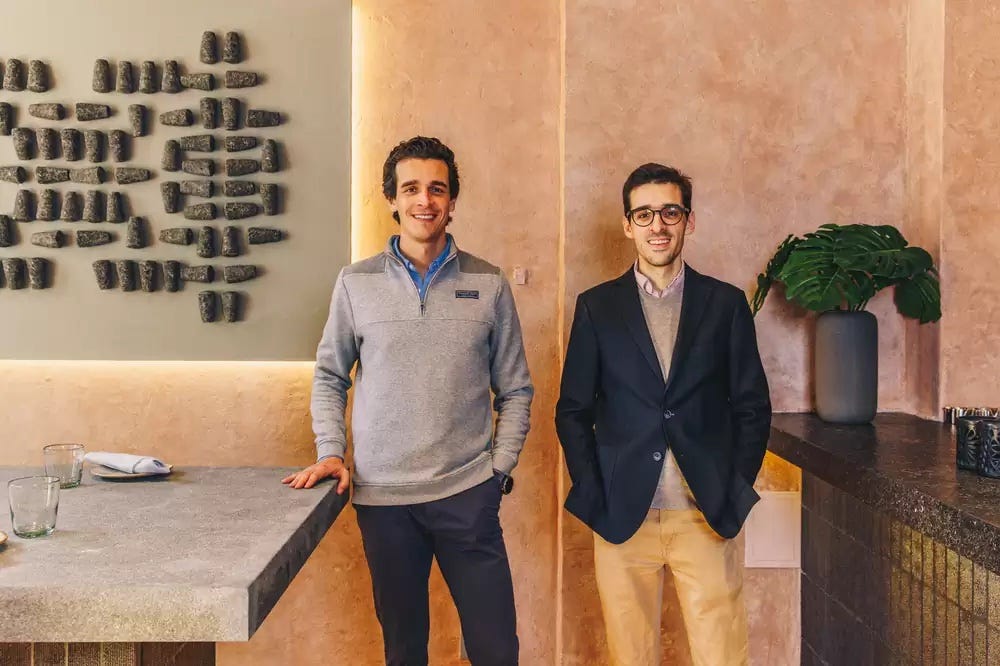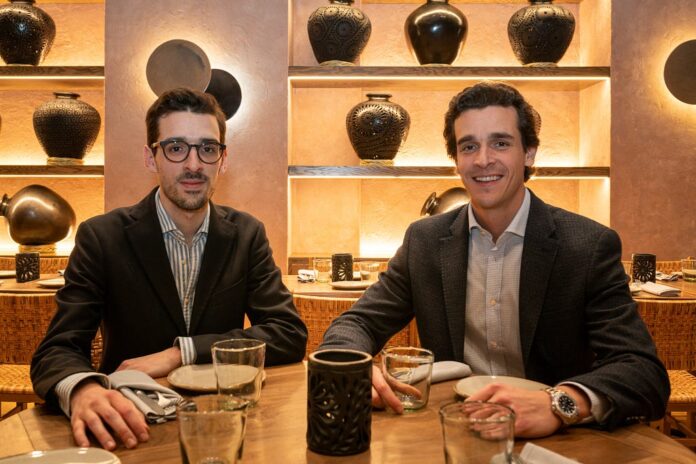Santiago Ramirez Degollado Of Casa Carmen: 5 Things I Wish Someone Told Me Before I Became a Restaurateur
An Interview With Martita Mestey
Be very diligent and constantly review cost estimates of recipes and cocktails and create proper checklists in order to control waste and maintain food quality.
As a part of our series about “5 Things I Wish Someone Told Me Before I Became a Restaurateur”, I had the distinct pleasure of interviewing Santiago Ramirez Degollado.
Santiago Ramirez Degollado serves as the beverage and financial manager at Casa Carmen. He earned his degree in Economics at ITAM, in Mexico City. He also works as a financial derivatives broker at Tradition in New York City.
Thank you so much for doing this with us! Our readers would love to ‘get to know’ you a bit. Can you share with our readers a story about what inspired you to become a restaurateur?
On both sides of my family, food and hospitality have been present for the past 3 generations. My grandmother took over Carnitas el Bajio when my grandfather died, and started cooking her mother’s and Nana Amparo’s recipes until she gained recognition in Mexico, and worldwide, for her recipes and traditional Mexican cuisine. On my mother´s side, my grandfather’s family had a Spanish restaurant in Gijon and then opened another in Oviedo. So, growing up eating with both sides of the family was a big deal. My grandmother Titita and my father Raul are role models for me, in their work ethic, and straightforward, bold, and practical nature. I always liked the ease with which Titita spoke to the patrons at her restaurant, even when correcting the way in which her dishes should be eaten.
Do you have a specific type of food that you focus on? What was it that first drew you to cooking that type of food? Can you share a story about that with us?
Mostly Mexican and Spanish food, both cuisines have mixed recipes and heritage. At Casa Carmen, we look for fresh ingredients, tortillas, chiles, and local protein. The wide variety and quality of seafood and meat we find in New York has allowed us to improve some of El Bajio’s dishes in Mexico City. We keep preparations and flavor constant with the recipes, and then let our chef play with different proteins depending on the season.
Can you share the funniest or most interesting story that happened to you since you became a restaurateur? What was the lesson or take away you took out of that story?
The opening days at Tribeca, many people came through the door looking for my grandmother “Titita,” including New York restaurant owners, neighbors who had a connection to her, chefs, journalists, and more. One of them told me “Your grandma cooked me the best meal I can remember.” It was incredible to see the buzz that her name created. She lost some of her cognitive abilities and short-term memory during the lockdown and pandemic, but the night of the opening she gave a 10-minute speech, as the “Titita” we always knew. This gave my brother and I goosebumps and pushed us to keep improving and growing. She is an inspiration for what hard work and stubbornness can do, she always repeats that “she is not a chef, she is a cook.” Being humble and creating new flavors and recipes after a very long process of trial and error — 50 years in the restaurant business makes that clear. As the third generation managing her legacy, we had and have the pressure to maintain Titita´s hospitality and cooking excellence for many years to come.
Can you tell us a story about the hard times that you faced when you first started your journey? How did you overcome this obstacle?
We were creating the beverage menu a couple of months before opening in Tribeca; selecting tequilas, mezcals, and wines. Two days before the opening, the whole bar crew resigned, and we had to hire hourly bartenders recommended by friends on the spot. The rotation at the bar was brutal for a couple of months, but slowly we managed to build a very good team through trial and error. Also adjusting the margarita and cocktail recipes to the palate of patrons in Tribeca was a long process.
In your experience, what is the key to creating a dish that customers are crazy about?
In my opinion, it has to be something the majority of customers have never tried before — a simple dish with fresh ingredients that can be replicated and eaten repeatedly. A dish as simple as fideo seco, noodles with avocado, chipotle, and cotija cheese is one of our bestsellers, which is what anyone in Mexico would eat at their mother or grandmothers house any given Monday.
Personally, what is the ‘perfect meal for you’?
Having late lunch with family or friends with Luis Miguel playing, starting with a very cold beer and a straight tequila, ceviche, or chicharron, and guacamole. Then, red wine with steak or lamb, ice cream and dark chocolate for dessert with an extensive sobremesa while drinking carajillos, and listening to Julio Iglesias.
Where does your inspiration for creating come from? Is there something that you turn to for a daily creativity boost?
Every time I sit down at a restaurant or at Casa Carmen, I try to be extremely meticulous and think about the little details that could improve customer experience. From music selection, vibe, lighting, food, seasonal cocktails, plate presentation, and customized service in order to make you feel very well taken care of, but not rushed. It is an ongoing process that never ends as we are constantly making little adjustments in order to improve.
Are you working on any new or exciting projects now? What impact do you think this will have?
We are working on establishing Casa Carmen as the go-to restaurant in New York for traditional Mexican cuisine. We are planning to open for lunch at the Flatiron location starting in September where customers will be able to try tortas, and healthy Mexican dishes as pechuga de pollo or arrachera and our usual tacos, empanadas, and tostadas. We offer unique, traditional home-made healthy Mexican food that you can eat for lunch daily at a very good price point.
What advice would you give to other restaurateurs to thrive and avoid burnout?
I would advise being very patient and learning to take both complaints and good reviews with a stoic attitude. Continue to learn every day how you can improve customer experience and operate efficiently in a very competitive environment with heavy regulations and taxes. Have a hobby or a way to disconnect sometimes from all the details and intensity that come with running a restaurant. Try to eat at your restaurant as if you were a patron frequently, this helps you be on top of the kitchen and the service.

Thank you for all that. Now we are ready for the main question of the interview. What are your “5 Things I Wish Someone Told Me When I First Started as a Restaurateur” and why?
- Real-world operation and day-to-day management of a restaurant are completely different from theory or any schooling you receive.
- Get a very good accountant and properly price for payroll costs as there are many hidden taxes, burdens, regulations, and extra payments that employers must bear.
- Be very diligent and constantly review cost estimates of recipes and cocktails and create proper checklists in order to control waste and maintain food quality.
- Align manager and chef’s incentives with the ownership.
- Be very practical and aware of people who want to sell you things you do not need.
What’s the one dish people have to try if they visit your establishment?
Garnachas — a very simple dish that reminds me of my childhood visits to my grandmother Titita at el Bajio. Sandra, a cook who worked with Titita for more than 30 years, made this out-of-this-world delicacy. They are made of handmade tortillas filled with red or green salsa, potatoes, brisket, and bit of garlic. Very simple yet savory, it never fails.
You are a person of enormous influence. If you could inspire a movement that would bring the most amount of good to the most amount of people, what would that be? You never know what your idea can trigger.
Hospitality and cooking at the end were made for people to socialize and be together sharing a meal or a drink. I would encourage people to go out more, meet in person, and live in the real world rather than on social media, like in the old days.
Thank you so much for these insights. This was very inspirational!
Santiago Ramirez Degollado Of Casa Carmen: 5 Things I Wish Someone Told Me Before I Became a… was originally published in Authority Magazine on Medium, where people are continuing the conversation by highlighting and responding to this story.


